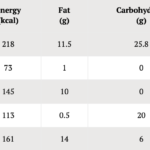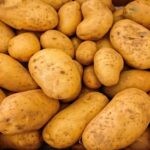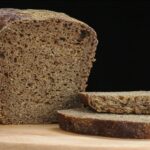Consuming equal ounce-equivalent portions of animal-based and plant-based protein foods, as per the Dietary Guidelines for Americans, leads to varying levels of essential amino acid bioavailability in both young and older adults. Protein derived from two-ounce-equivalents (oz-eq) of animal-based foods offers higher bioavailability of essential amino acids (EAA) than the same amount from plant-based sources, according to scientists […]
Billions of nanoplastics released when microwaving baby food containers
The fastest way to heat food and drink might also rank as the fastest route to ingesting massive quantities of minuscule plastic particles, says new research from the University of Nebraska-Lincoln. Experiments have shown that microwaving plastic baby food containers available on the shelves of U.S. stores can release huge numbers of plastic particles — […]
Soaking Potatoes In Water Before Frying Reduces Acrylamide
Good news for chips lovers everywhere — new research in the journal Science of Food and Agriculture shows that pre-soaking potatoes in water before frying can reduce levels of acrylamide. Acrylamide is a naturally occurring chemical that occurs when starch rich foods are cooked at high temperatures, such as frying, baking, grilling or roasting. There […]
Kombucha to kimchi: Which fermented foods are best for your brain?
Many countries around the world have their own staple fermented foods which are ingrained into culture and diet. It can’t be a coincidence that this has happened again and again. It seems logical that fermented foods offer more than a method of preservation.? Diet can hugely impact your mental health and previous research has shown […]
Researchers Unlock The Mystery Of The Jellybean
The association of jellybeans with the Easter season is as commonplace as chocolates on Valentine’s Day and evergreens at Christmas. But most who love munching on the jelly-filled delicacies in the sugar shell know little about the creation and physics of this confectionery marvel. Gregory Ziegler, associate professor of food science at Penn State University, […]
Ultra-processed foods may be linked to increased risk of cancer
Higher consumption of ultra-processed foods may be linked to an increased risk of developing and dying from cancer, an Imperial College London-led observational study suggests. Researchers from Imperial’s School of Public Health have produced the most comprehensive assessment to date of the association between ultra-processed foods and the risk of developing cancers. Ultra-processed foods are […]
Rye is healthy, thanks to an interplay of microbes
Eating rye comes with a variety of health benefits. A new study from the University of Eastern Finland now shows that both lactic acid bacteria and gut bacteria contribute to the health benefits of rye. Published in Microbiome, the study used a metabolomics approach to analyse metabolites found in food and the human body. Rye sourdough […]
The TOP FOODS You Absolutely SHOULD NOT EAT To Live Longer! | Dr. Sten Ekberg & Lewis Howes
Lewis Howes interviews Dr. Ekberg covering topics such as what foods you should eat and what foods you should avoid. They cover best natural ways to increase human growth hormone, the most common mistakes people make with their health and so much more! Dr. Ekberg covers health tips like healthy foods to eat, nutrition, weight […]
Common food dye can trigger inflammatory bowel diseases, animal study suggests
Long-term consumption of Allura Red food dye can be a potential trigger of inflammatory bowel diseases (IBDs), Crohn’s disease and ulcerative colitis, says McMaster University’s Waliul Khan. Researchers using experimental animal models of IBD found that continual exposure to Allura Red AC harms gut health and promotes inflammation. The dye directly disrupts gut barrier function […]
Mandatory labeling on genetically engineered foods may reduce customer purchases
Labels alerting customers that products contain ingredients from genetically engineered plants may reduce sales, at least in the short term, according to a new study from a research team including an agricultural economist in Penn State’s College of Agricultural Sciences. The study analyzed sales trend data from Vermont after a law went into effect requiring […]









